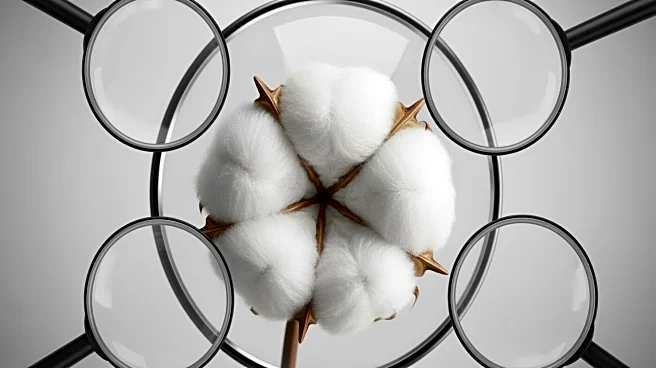What's Happening?
The Pakistan Cotton Ginners Association (PCGA) has uncovered significant issues within the cotton industry in lower Sindh, a region known for its cotton production. Recent surprise inspections by PCGA members
revealed that some ginning factories are producing adulterated lint cotton by mixing cotton waste with seed cotton. This practice compromises the quality of yarn and the strength of textile products. The adulterated cotton is being supplied to both domestic spinning and textile mills and for export, jeopardizing the integrity of the entire sector. The inspections took place in Mirpurkhas and Sanghar districts, with the latest occurring in October. Former PCGA chairman Mahesh Kumar noted an increase in such ginning units, which threatens fair trade practices and the industry's credibility. The PCGA's actions have led to legal challenges, as seen in Tando Adam city, where the team faced criminal proceedings after their intervention.
Why It's Important?
The adulteration of cotton poses a significant threat to Pakistan's cotton industry, which has been struggling to regain its footing. The practice not only affects the quality of domestic textile products but also tarnishes the reputation of Pakistani cotton on the international market. This could lead to a preference for imported cotton from countries like the US and Argentina, further harming local producers. The issue highlights systemic problems within the supply chain, including unfair practices against cotton growers and the need for stricter regulations and enforcement. The situation underscores the importance of maintaining quality standards to ensure the competitiveness of Pakistan's cotton industry globally.
What's Next?
The PCGA is likely to continue its efforts to expose and address malpractices within the industry. There may be calls for stricter regulatory measures and penalties for those involved in adulteration. The textile and spinning industries might push for more transparency and accountability in the supply chain. Additionally, there could be increased advocacy for premium pricing for high-quality cotton to incentivize fair practices. The ongoing legal proceedings in Tando Adam may set a precedent for how such cases are handled in the future.
Beyond the Headlines
The issue of cotton adulteration raises broader questions about ethical practices in the agricultural sector and the role of regulatory bodies in enforcing standards. It also highlights the challenges faced by developing countries in maintaining competitive industries while ensuring fair trade practices. The situation may prompt discussions on the need for better support and incentives for local farmers to produce high-quality crops.








